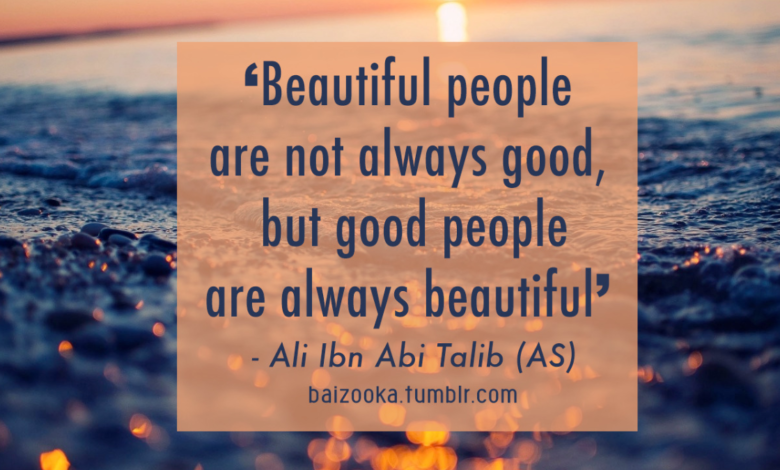Beauty and Wisdom of Islamic Quotes: Timeless Guidance for Every Soul

Introduction: The Power of Words in Islam
Words hold immense power in every culture, but in Islam, they carry a sacred weight. The Quran itself, revealed as the word of Allah (SWT), is the most profound example of how language is revered in the Islamic tradition. Islamic quotes—whether from the Quran, Hadith, or wise scholars—serve as concise reminders of deep truths. These quotes don’t just inspire; they educate, heal, and connect Muslims to their Creator.
Islamic quotes are more than just pretty words on a social media post. They are often rooted in centuries of wisdom, offering direction in moments of confusion, solace in times of grief, and motivation during hardship. Their brevity doesn’t take away from their depth; in fact, it enhances their impact. Just a few words can transform your mindset.
From guiding your daily life to helping shape your character, Islamic quotes are like small beacons of light that illuminate the right path. They’re used in khutbahs (sermons), taught to children, and exchanged between friends. In this article, we’ll dive into different categories of Islamic quotes and how they influence Muslims’ spiritual, emotional, and even social lives.
Islamic Quotes from the Quran: Divine Words for Daily Life
When people talk about Islamic quotes, Quranic verses are usually the first that come to mind. And rightly so. The Quran is the foundation of Islamic thought and action. Every verse has layers of meaning, and even short verses can be packed with spiritual depth.
Take, for instance, the popular quote: “Indeed, with hardship comes ease” (Quran 94:6). This single sentence has comforted millions of people facing adversity. It’s a divine promise that every struggle is paired with relief, even if it’s not immediately apparent. The beauty lies in its universality—it applies to personal loss, financial difficulties, or emotional struggles.
Another beloved quote is: “Verily, in the remembrance of Allah do hearts find rest” (Quran 13:28). It’s not just a spiritual statement; it’s also a psychological one. In a world plagued by anxiety and stress, this verse is a reminder that turning to Allah provides a unique form of peace that nothing else can offer. It’s why many Muslims make dhikr (remembrance) part of their daily routine.
Many Quranic quotes are also directives for behavior. Verses like “And speak to people good [words]” (Quran 2:83) serve as a reminder of our moral responsibility in speech. These quotes aren’t just about belief—they guide actions, mold character, and build community.
Quotes from the Prophet Muhammad (PBUH): Hadith That Inspire
The sayings of Prophet Muhammad (peace be upon him) are a treasure trove of wisdom. His Hadith (sayings and actions) are second only to the Quran in authority and influence in a Muslim’s life. And when it comes to quotes, the Hadith literature is full of short, potent gems.
One famous quote is: “The strong is not the one who overcomes people by his strength, but the strong is the one who controls himself while in anger.” This Hadith flips the worldly definition of strength on its head. It’s a lesson in emotional intelligence and self-control, highly relevant even in today’s world where tempers flare easily.
Another powerful quote is: “None of you truly believes until he loves for his brother what he loves for himself.” This speaks volumes about empathy and the Islamic vision of community. It’s not just about being kind; it’s about embodying a deep, active sense of compassion that goes beyond surface-level concern.
Prophet Muhammad (PBUH) also said, “The best among you are those who have the best manners and character.” Islam isn’t a religion limited to rituals—it’s a full way of life, and character holds a central place in it. Quotes like these push Muslims to be better in their day-to-day dealings, not just in their spiritual obligations.
Inspirational Quotes from Islamic Scholars
While the Quran and Hadith are the core sources, Islamic scholars throughout history have also shared incredible insights. Figures like Imam Ghazali, Ibn Taymiyyah, Rumi, and even contemporary scholars like Mufti Menk and Yasmin Mogahed have gifted us with words that echo timeless truths.
Imam Al-Ghazali once said: “Desires make slaves out of kings and patience makes kings out of slaves.” This quote isn’t just poetic—it’s a deep reflection on human nature and discipline. It reminds Muslims that spiritual strength is built not through indulgence but through self-restraint.
Rumi, although a poet and mystic, has quotes that resonate deeply with many Muslims: “Don’t grieve. Anything you lose comes round in another form.” This aligns with the Quranic message of divine wisdom and destiny. Rumi’s words often blend emotion and theology, making his quotes feel both human and holy.
Modern scholars continue this tradition. Yasmin Mogahed writes: “You keep running after the love of people, but the only love that frees you is the love of Allah.” It’s a relevant reminder in a time of social media validation and the constant chase for approval. Quotes like these ground the soul.
Quotes About Patience (Sabr) and Perseverance
Patience, or sabr, is one of the most frequently emphasized virtues in Islam. It’s not just a passive waiting game—it’s active trust in Allah’s plan. Islamic quotes about patience are empowering because they remind you that your struggles have meaning.
“So be patient. Indeed, the promise of Allah is truth” (Quran 30:60) is a direct command paired with assurance. The struggle you face is not ignored by Allah; it’s seen, and His promise will be fulfilled. That knowledge can turn pain into purpose.
Prophet Muhammad (PBUH) said: “Patience is light.” Just two words, but think about that—patience doesn’t just help you survive the darkness; it is the light in the darkness. It’s what gives you vision when you can’t see a way out.
Islamic tradition also teaches that patience isn’t just for hard times—it’s needed in good times too. Staying grateful, staying humble, and resisting arrogance all require a form of patience. It’s a lifelong practice, and Islamic quotes keep that lesson alive.
Quotes About Gratitude (Shukr) and Contentment
Gratitude, or shukr, is deeply embedded in the Islamic worldview. Every chapter of the Quran (except one) begins with “Bismillah-ir-Rahman-ir-Rahim”, reminding us to begin with gratitude for Allah’s mercy. Islamic quotes around this theme remind us to see the blessings in our lives.
“If you are grateful, I will increase you [in favor]” (Quran 14:7) is a promise from Allah that gratitude leads to abundance. It’s not just material abundance—it includes emotional, spiritual, and social growth. Practicing gratitude is essentially a form of worship.
The Prophet (PBUH) said: “Look at those below you and not those above you, for that is more likely to make you appreciate what Allah has given you.” This quote teaches emotional intelligence and contentment. In a consumer-driven world, it’s a reminder to focus on sufficiency rather than scarcity.
Gratitude in Islam is not just about saying “thank you.” It’s about living a life that reflects appreciation—using what you have wisely, helping others, and constantly acknowledging Allah’s favors.
Quotes on Forgiveness and Mercy
Forgiveness is a cornerstone of Islamic ethics. Not only is Allah (SWT) described as Al-Ghafoor (The Forgiving) and Ar-Rahim (The Merciful), but Muslims are also expected to emulate those qualities.
“But if you pardon and overlook and forgive – then indeed, Allah is Forgiving and Merciful” (Quran 64:14). This verse speaks volumes about the moral high ground in forgiving others, even when they hurt you. It’s about healing rather than holding grudges.
The Prophet (PBUH) said: “Show mercy to those on the earth, and the One above the heavens will show mercy to you.” This quote teaches a beautiful reciprocal relationship between human mercy and divine mercy. It reinforces the idea that kindness is a form of worship.
Forgiveness in Islam isn’t about being passive or naïve. It’s about rising above ego, trusting Allah’s justice, and freeing yourself from the burden of resentment. Islamic quotes serve as gentle but powerful reminders of that higher path.
Quotes on Justice and Fairness
Justice is a divine attribute in Islam. Allah is Al-Adl (The Just), and Muslims are called to uphold justice in all aspects of life—family, business, society. Islamic quotes about justice often emphasize accountability and moral integrity.
“O you who believe, be persistently standing firm in justice, witnesses for Allah” (Quran 4:135). This quote shows that justice isn’t optional or circumstantial—it’s a duty. Even if it means going against your own interest or family, justice must prevail.
The Prophet (PBUH) said: “Help your brother, whether he is an oppressor or he is oppressed.” When asked how to help an oppressor, he replied: “By preventing him from oppressing others.” This quote is radical in its call to moral courage.
Justice in Islam is deeply tied to accountability—before people and before Allah. It’s not just about laws and courts; it’s about daily choices, from treating employees fairly to being honest in business. Quotes on justice are reminders of that sacred responsibility.
Quotes About Love and Brotherhood
Islam puts a strong emphasis on love—not just romantic love, but love for Allah, for the Prophet (PBUH), and for fellow human beings. The concept of ummah (community) thrives on this bond of brotherhood.
The Prophet said: “The believers, in their mutual love, mercy, and compassion, are like the body; when one part aches, the whole body responds with sleeplessness and fever.” This powerful metaphor explains Islamic solidarity in the most human way possible.
“He loves them and they love Him” (Quran 5:54) describes the relationship between Allah and the believers. This divine love is not transactional—it’s rooted in mercy, guidance, and trust.
Islamic quotes on love also highlight the importance of sincerity. Love for the sake of Allah (hub fillah) is considered the purest form of love. It transcends selfish desires and is based on shared values, faith, and purpose.
Conclusion: Living Through the Light of Islamic Quotes
Islamic quotes are not meant to be read once and forgotten. They are reminders, inspirations, and instructions. Whether you’re having a good day or a terrible one, there’s an Islamic quote that speaks directly to your situation.
These quotes are timeless because they speak to the eternal human condition—struggles, hopes, fears, and dreams. They’re not abstract or irrelevant; they are deeply practical, guiding how we treat ourselves, our families, and society.
Make it a habit to learn a new Islamic quote regularly. Write them down, share them, reflect on them. In a world that often pulls us in many directions, these small pieces of wisdom can keep us grounded in faith, purpose, and peace.
FAQs about Islamic Quotes
1. Why are Islamic quotes important in daily life? Islamic quotes offer guidance, comfort, and wisdom. They help Muslims stay connected to their faith and provide moral and spiritual direction.
2. Can non-Muslims benefit from Islamic quotes? Absolutely. Many Islamic quotes promote universal values like kindness, patience, and justice. Non-Muslims often find them inspirational as well.
3. Are all Islamic quotes from the Quran? No. While many come from the Quran, others are from Hadith, Islamic scholars, poets, and thinkers. Each offers unique insight and wisdom.
4. How can I use Islamic quotes effectively? You can use them in personal reflection, share them with others, or even incorporate them into art or writing. The key is to understand and apply their meaning.
5. Where can I find authentic Islamic quotes? Authentic quotes can be found in the Quran, Sahih Hadith collections, and reputable books or websites run by qualified Islamic scholars.





